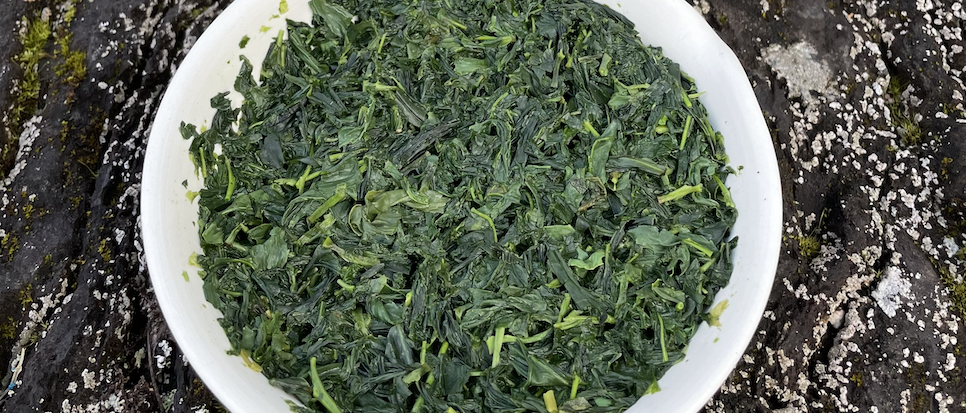What’s all the buzz about L-theanine? At least here in Japan, there have been several advertisements stating that this prominent compound in green tea has health, focus and energy benefits superior to that of caffeine. Especially matcha companies suggest that because of L-theanine, green tea provides a more moderate energy boost and doesn’t cause jitteriness. We dispatched our science team to dig into the research and give a summary. Here’s what they found.
L-theanine is a water-soluble amino acid present in leaves of the tea plant, Camellia sinensis. L-theanine, which was first identified in 1949 (Eschenauer et. al., 2006) is responsible for the umami flavor of green tea (Cooper et. al., 2012) and like caffeine, crosses the blood-brain barrier and impacts how our brains function. A typical cup of tea contains around 20 – 40 mg of L-theanine and 40 mg of caffeine. L-theanine and caffeine content vary widely and can be influenced by type of tea, harvest method and other factors (Li et. al., 2022). A typical cup of coffee contains 1.4 to 3.4 times more caffeine and no L-theanine (Rogers et.al., 2007).
In order to precisely control the amount of L-theanine and caffeine, most experiments are conducted using single doses of pure L-theanine and/or caffeine. Research considered for this article was conducted on human subjects, and while the doses were relatively high (typically around 200 mg), the does is comparable to several cups of tea over the course of a day. The research reviewed does indeed indicate that L-theanine combined with caffeine has unique attention and energy enhancing properties. The attention and energy enhancing benefits are in part due the effect of L-theanine directly on our brain, as well as what chemists call “antagonism” between L-theanine and caffeine. This antagonism results in a slowed release of caffeine into the body, as well as reducing maximum blood pressure and slowing the increase of blood pressure (Rogers et. al., 2008). The cushioning effect on blood pressure, and the generally lower amount of caffeine in tea, may be responsible for the reports of feeling less jittery.
The focus and sustained energy effects are unique to tea because tea contains both caffeine and L-theanine, while coffee does not contain L-theanine. There may be additional health benefits of L-theanine but they require further research, especially concerning the impact of low doses in a typical cup of tea rather than the high doses in clinical trials. Similarly, other health related benefits of tea may be related to polyphenols and catechins, but fully understanding those benefits also requires further research.
In summary, the reported sustained focus and energy enhancement associated of L-theanine has some scientific backing. The effects of L-theanine have to do with its unique modes of action in our brain and its antagonism with caffeine.
However, since most research is conducted using single large doses of L-theanine, the research we found cannot be used to comment on the effect of several smaller doses over the course of the day, a pattern which would be more typical of a tea drinker. The limitations of extending results using clinical doses of L-theanine to daily tea consumption were highlighted by Williams et. al., 2020. A brief review of some of the literature can be found below.
 Figure 1. Chemical structure of caffeine and L-theanine.
Figure 1. Chemical structure of caffeine and L-theanine.
There are many suggestions in the literature that L-theanine can reduce stress and anxiety, as reviewed by Williams et. al. (2020). In addition to the antagonism with caffeine, which seems to be related to its ability to “buffer” stress and anxiety, L-theanine may have benefits for depression, cognition and insomnia (Wang et. al., 2022; Li et. al., 2022).
A double-blind, placebo-controlled study of 48 adult participants included treatments of theanine or caffeine administered alone and together (Rogers et. al., 2008). They found caffeine increased alertness, jitteriness and blood pressure, while L-theanine antagonized the effect of caffeine on blood pressure. Another study similarly combined doses of L-theanine and caffeine and found the combination has positive impacts on cognitive performance and mood (Owen et. al., 2008).
A 2022 double blind study of 22 young adults indicated that L-theanine increased the ability of subjects to focus on a given auditory stimulus, as gauged by observing electric signals in the brain (Dassanayake et. al., 2022).
Sohail et. al. (2021) conducted a systematic literature review of other scientific articles on the cognitive enhancing interaction between caffeine and L-theanine and found that the combination “is likely a safe and effective cognitive enhancer.”
A similar 2020 literature review of nine other peer reviewed articles found that high doses of L-theanine (200-400mg is common for these clinical trials) may help reduce stress and anxiety but say that more research is needed on regular consumption of low doses (Williams et. al., 2020).
A recent review by Łata et.al. (2024) on the effects of L-theanine on mental health suggests that while the moderate amount of L-theanine in a typical cup of tea is unlikely to have an impact on mental health, research involving much higher doses is promising and more research is merited. They highlight that the pharmacological mechanism(s) of action and interaction with other chemicals are not fully understood.

Gyokuro, one of the types of tea with the most L-theanine.

Table 1. The amount of theanine in a brewed cup of tea vary widely based on environment, harvest timing, harvest method, processing and amount of tea used to brew the tea. A typical green tea may have between 20 and 40 mg theanine and a similar amount of caffeine. An early harvest, shaded tea such as gyokuro or matcha may contain over 50 mg theanine and a similarly elevated amount of caffeine. A coffee contains around 70 to 150 mg caffeine and no theanine.
Credit The review of the literature was done by Yunomi's research partner who prefers to be anonymous.
References
Anas Sohail A, Ortiz F, Varghese T, et al. (December 30, 2021) The Cognitive-Enhancing Outcomes of Caffeine and L-theanine: A Systematic Review. Cureus 13(12): e20828. doi:10.7759/cureus.20828
Cooper R (2012) Green tea and theanine: health benefits. Int J Food Sci Nutr 63(Suppl 1):90–97
Dassanayake TL, Kahathuduwa CN, Weerasinghe VS. (2022.) L-theanine improves neurophysiological measures of attention in a dose-dependent manner: a double-blind, placebo-controlled, crossover study. Nutritional Neuroscience. Apr;25(4):698-708. DOI: 10.1080/1028415x.2020.1804098. PMID: 32777998.
Eschenauer G, Sweet BV. (2006). Pharmacology and therapeutic uses of theanine. Am J Health Syst Pharm 63(1):26, 28–30
Kahathuduwa CN, Dhanasekara CS, Chin SH, Davis T, Weerasinghe VS, Dassanayake TL, Binks M: l-Theanine and caffeine improve target-specific attention to visual stimuli by decreasing mind wandering: a human functional magnetic resonance imaging study. Nutr Res. 2018, 49:67-78. 10.1016/j.nutres.2017.11.002
Kahathuduwa CN, Dassanayake TL, Amarakoon AM, Weerasinghe VS: Acute effects of theanine, caffeine and theanine-caffeine combination on attention. Nutr Neurosci. 2017, 20:369-77. 10.1080/1028415X.2016.1144845
Haskell CF, Kennedy DO, Milne AL, Wesnes KA, Scholey AB: The effects of L-theanine, caffeine and their combination on cognition and mood. Biol Psychol. 2008, 77:113-22. 10.1016/j.biopsycho.2007.09.008
Li MY, Liu HY, Wu DT, Kenaan A, Geng F, Li HB, Gunaratne A, Li H, Gan RY. (2022). L-theanine: A unique functional amino acid in tea (Camellia sinensis L.) with multiple health benefits and food applications. Frontiers in Nutrition. Apr 4;9:853846.
ŁATA, Michał, GETKA, Beata, KWIECIEŃ, Justyna, PRZYBOROWSKA, Kinga, WIEJAK, Katarzyna and RUKAT, Mateusz. (2024). The application of L-theanine for patients with mental health conditions - a review. Journal of Education, Health and Sport. 53:137-147. eISSN 2391-8306. https://dx.doi.org/10.12775/JEHS.2024.53.010
Owen, G. N., Parnell, H., De Bruin, E. A., & Rycroft, J. A. (2008). The combined effects of L-theanine and caffeine on cognitive performance and mood. Nutritional Neuroscience, 11(4), 193–198. https://doi.org/10.1179/147683008X301513
Rogers, P.J., Smith, J.E., Heatherley, S.V. et al. (2008). Time for tea: mood, blood pressure and cognitive performance effects of caffeine and theanine administered alone and together. Psychopharmacology 195, 569–577 https://doi.org/10.1007/s00213-007-0938-1
Wang L, Brennan M, Li S, Zhao H, Lange KW, Brennan C. (2022). How does the tea L-theanine buffer stress and anxiety. Food Science and Human Wellness. May 1;11(3):467-75.
Williams, J.L., Everett, J.M., D’Cunha, N.M. et al. (2020). The Effects of Green Tea Amino Acid L-Theanine Consumption on the Ability to Manage Stress and Anxiety Levels: a Systematic Review. Plant Foods Hum Nutr 75, 12–23 https://doi.org/10.1007/s11130-019-00771-5


